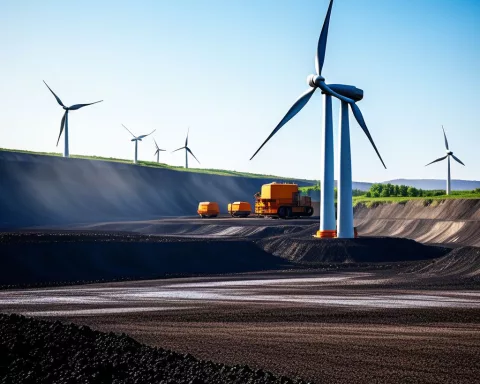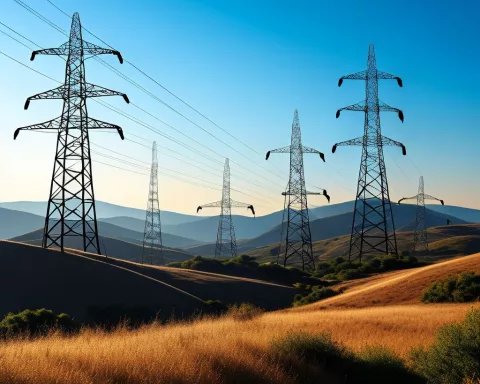President Ramaphosa spoke at the JET Municipal Conference about the crucial role of South African municipalities in the country’s energy transition towards low-carbon development. He emphasized the need to lessen reliance on carbon-heavy energy production, diversify energy sources, and stimulate economic growth while fulfilling the country’s commitment to combat climate change. Municipalities were identified as key players in providing clean, affordable energy and facilitating decarbonization efforts. The speech also addressed challenges surrounding municipal debt owed to Eskom and the need for infrastructure upgrades and expansion.
What was discussed during President Ramaphosa’s speech at the JET Municipal Conference?
President Ramaphosa emphasized the crucial role South African municipalities play in the country’s energy transition towards low-carbon development. He highlighted the necessity to lessen reliance on carbon-heavy energy production, diversify energy sources, and stimulate economic growth while fulfilling the country’s commitment to combat climate change. Municipalities were identified as key players in providing clean, affordable energy and facilitating decarbonization efforts. The speech also addressed challenges surrounding municipal debt owed to Eskom and the need for infrastructure upgrades and expansion.
At the bustling Gallagher Convention Centre in Johannesburg, an important speech was made by President Cyril Ramaphosa during the initial Just Energy Transition (JET) Municipal Conference. He stressed upon the crucial role South African municipalities play in the country’s ambitious yet essential energy transition.
Prioritizing Sustainable Economic Growth
A key priority of the Nation’s United Government, as articulated by Ramaphosa, is the swift and sustainable economic growth that includes everyone. The President asserted that the way forward is through climate-conscious, low-carbon development. While this path poses its own set of hurdles, it also represents a promising opportunity for the South African nation.
Electricity generated from fossil fuels is a major contributor to the country’s carbon emissions, Ramaphosa pointed out. South Africa’s dependence on power from coal-burning power plants run by Eskom makes the economy precariously carbon-heavy. This dependence on fossil fuels for industrial growth, given global changes in energy norms, presents significant risks to the economy, society, and the environment.
Balancing Energy Production and Economic Competitiveness
The President highlighted that many of South Africa’s main trading partners have committed to achieving net-zero emissions within set timelines. This commitment influences South African goods entering these markets and the nation’s economic competitiveness.
Ramaphosa highlighted the necessity to lessen the reliance on carbon-heavy energy production and diversify energy sources to stimulate economic growth. The country is well-positioned to leverage the global energy transition to foster growth, development, and create jobs.
As part of the Paris Agreement, South Africa has pledged to contribute its fair share to global efforts to combat climate change. The President advocated fulfilling this commitment in a way that ensures fair outcomes for those affected by the energy transition, while promoting inclusive economic growth, energy security, and job creation.
Role of Municipalities in Decarbonization Efforts
Ramaphosa praised the success of the Renewable Energy Independent Power Producer Procurement Programme, which has attracted over R209 billion in investment and added much-needed capacity to the electricity grid. The President also noted regulatory changes made in 2021 to increase the licensing threshold for generation projects, resulting in over 130 confirmed projects.
He emphasized that municipalities, as they own and operate nearly half of South Africa’s electricity distribution grid, play a crucial role in decarbonizing the energy sector. They must take the lead in providing clean, affordable energy to communities, businesses, and industry. The conference, he noted, aims to facilitate the institutional arrangements necessary for the decarbonization efforts.
The President discussed the Just Energy Transition Implementation Plan, approved by the Cabinet the previous year. This plan includes a dedicated municipal portfolio roadmap with three areas of focus: affordable clean electricity access, sustainable financing for electricity infrastructure, and bolstering the capacity of municipalities to manage the transition.
Dealing with Challenges and Infrastructure Needs
Ramaphosa addressed the need to tackle difficult questions surrounding electricity pricing structures and substantial levels of municipal debt owed to Eskom. He underscored the need to ensure the energy transition doesn’t exacerbate energy poverty or deepen inequality.
He stressed that the municipal grid system requires upgrades, modernization, and expansion. A significant investment is required to achieve this, which necessitates tapping into both public and private capital sources. The government, therefore, is working on financing solutions, including concessional loans, for the National Transmission Company of South Africa to expand the grid.
Concluding Remarks and Future Strategies
During his address, Ramaphosa announced the establishment of the JET Municipal Forum and its secretariat. He affirmed the national government’s commitment to collaborate with the South African Local Government Association (SALGA) and mayors to align with the local government’s JET action plan.
Wrapping up his address, he praised the Just Energy Transition Project Management Unit in the Presidency and SALGA for hosting the conference. He encouraged deeper collaboration among the government, business, labor, and civil society to secure a sustainable, beneficial energy future for everyone.
1. What was discussed during President Ramaphosa’s speech at the JET Municipal Conference?
President Ramaphosa emphasized the crucial role South African municipalities play in the country’s energy transition towards low-carbon development. He highlighted the necessity to lessen reliance on carbon-heavy energy production, diversify energy sources, and stimulate economic growth while fulfilling the country’s commitment to combat climate change. Municipalities were identified as key players in providing clean, affordable energy and facilitating decarbonization efforts. The speech also addressed challenges surrounding municipal debt owed to Eskom and the need for infrastructure upgrades and expansion.
2. What is the priority of the United Government in South Africa?
One of the key priorities of the United Government in South Africa, as articulated by President Ramaphosa, is the swift and sustainable economic growth that includes everyone. This includes climate-conscious, low-carbon development to reduce the country’s reliance on fossil fuels and decrease carbon emissions.
3. How does South Africa’s dependence on fossil fuels affect its economic competitiveness?
Many of South Africa’s main trading partners have committed to achieving net-zero emissions within set timelines. This commitment influences South African goods entering these markets and the nation’s economic competitiveness. Therefore, diversifying energy sources and reducing reliance on carbon-heavy energy production is necessary to stimulate economic growth and remain competitive in the global market.
4. What is the role of municipalities in South Africa’s decarbonization efforts?
Municipalities, which own and operate nearly half of South Africa’s electricity distribution grid, play a crucial role in decarbonizing the energy sector. They must take the lead in providing clean, affordable energy to communities, businesses, and industry. The Just Energy Transition Implementation Plan includes a dedicated municipal portfolio roadmap with three areas of focus: affordable clean electricity access, sustainable financing for electricity infrastructure, and bolstering the capacity of municipalities to manage the transition.
5. What challenges does South Africa face in its energy transition, and how are they being addressed?
South Africa faces challenges surrounding electricity pricing structures and substantial levels of municipal debt owed to Eskom. The energy transition must not exacerbate energy poverty or deepen inequality. The municipal grid system requires upgrades, modernization, and expansion, which necessitates tapping into both public and private capital sources. The government is working on financing solutions, including concessional loans, for the National Transmission Company of South Africa to expand the grid.
6. What future strategies were discussed during President Ramaphosa’s speech?
President Ramaphosa announced the establishment of the JET Municipal Forum and its secretariat. He affirmed the national government’s commitment to collaborate with the South African Local Government Association (SALGA) and mayors to align with the local government’s JET action plan. He encouraged deeper collaboration among the government, business, labor, and civil society to secure a sustainable, beneficial energy future for everyone.












